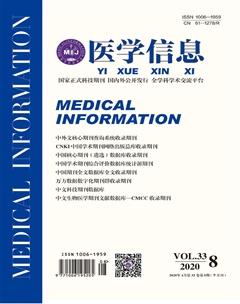高血压患者规律服药情况及其影响因素分析
潘建鑫 江瑾玥



摘要:目的 了解高血压患者规律服药的现状及其影响因素,提高患者的服药依从性。方法 采用随机抽样的方法,选取2018年7月~2019年6月在我院就诊的268例高血压患者,使用Morisky-Green问卷了解患者规律服药的情况。结果 268例患者中规律服药占比38.06%(102/268)。未规律服药占比61.94%(166/268),未规律服药患者中24.70%因“医务人员未告知规律服药重要性”,22.29%因“不知晓高血压疾病的危害”,16.87%认为“血压正常后没必要继续服药”,13.86%因“担心长期服药的药物副作用”,9.64%因“自觉药物效果不好”,7.23%因“经济情况受限”,4.22%因“经常忘记服药”,1.20%因其他原因未规律服药;不同性别规律服药例数比较,差异无统计学意义(P>0.05),60岁以下规律服药例数高于60岁及以上(P<0.05)。初中及以下规律服药例数低于高中及以上(P<0.05)。多因素logistic回归分析结果显示,年龄≥60岁、文化程度在初中及以下是未规律服药的独立危险因素。结论 目前高血压患者规律服药的占比偏低,患者缺乏对高血压疾病以及治疗药物的正确认识是未规律服药的主要原因,年龄超过60岁、文化程度在初中及以下患者规律服药的情况越差。医务人员加强患者的健康教育、提高患者对高血压疾病的认知,提高高血压患者服药依从性。
关键词:高血压;规律服药;影响因素
中图分类号:R544.1 文獻标识码:A DOI:10.3969/j.issn.1006-1959.2020.08.050
文章编号:1006-1959(2020)08-0153-02
Abstract:Objective To understand the status quo and influencing factors of patients taking hypertension regularly,and to improve their compliance with taking drugs.Methods Random sampling was used to select 268 patients with hypertension who were treated in our hospital from July 2018 to June 2019,and Morisky-Green questionnaire was used to understand the patients' regular medication.Results Regular medication accounted for 38.06%(102/268)of 268 patients.Non-regular medication accounted for 61.94%(166/268),24.70% of patients who took irregular medication because"the medical staff did not inform the importance of regular medication",22.29% because "do not know the dangers of hypertension",16.87% thought that "blood pressure it is not necessary to continue taking the medicine after it is normal.13.86% did not insist on taking medicine because of "worry about the side effects of taking medicine for a long time",9.64% did not insist on taking medicine because of "conscientious medicine effect is not good",7.23% because of "economic constraints",4.22% because of "regular""forget to take medicine",1.20% did not take medicine regularly for other reasons;there was no statistically significant difference in the proportion of men and women taking medicine regularly(P>0.05),and the proportion of taking medicine under 60 years old was higher than that of 60 years old and above(P<0.05).The proportion of taking medicine regularly in junior high school and below was lower than that in high school and above(P<0.05).The results of multivariate logistic regression analysis showed that age ≥60 years old and education level in junior high school and below were independent risk factors for irregular medication.Conclusion At present,the proportion of hypertensive patients taking regular medication is low.The lack of correct understanding of hypertension and treatment drugs is the main reason for non-regular medication.Patients who are over 60 years old and have junior high school education and below are regularly taking medication.difference.Medical personnel strengthen the health education of patients,improve patients' awareness of hypertension, and improve the compliance of patients with hypertension.
Key words:Hypertension;Regular medication;Influencing factors
高血压(hypertension)是常见的慢性非传染性疾病,在我国患病人数已超过2亿,且我国人群高血压的患病率仍呈升高趋势。血压水平与心脑血管病发病和死亡风险之间关系密切[1],血压控制不佳会增加患者罹患心脑血管疾病的风险和死亡风险,因而控制高血压是降低心脑血管疾病发病率、致残率和死亡率的有效措施。规律服用降压药物是有效控制血压的关键因素,本文主要探讨高血压患者规律服药的情况及其影响因素,以期提高高血压患者服药依从性,改善高血压患者生存质量,现报道如下。
1对象与方法
1.1研究对象 收集2018年7月~2019年6月在重庆医科大学附属大学城医院就诊的高血压患者268例。纳入标准:符合中国高血压防治指南(2018年修订版)关于高血压的诊断标准[2];确诊高血压病程在1年或1年以上,正在服用或曾经服用降压药物治疗,意识清楚,对答良好,理解力正常。排除标准:①确诊高血压病程<1年;②言语交流障碍者;③合有严重的认知功能障碍者。本研究经本院伦理委员会批准,患者均自愿加入并签署知情同意书。
1.2研究方法 采用问卷调查的方式了解患者的情況。内容包括患者性别、年龄、文化程度、血压控制情况、规律服药情况、未规律服药的原因。其中规律服药的判断依据Morisky-Green测评表(MG)[3]:用4个小问题确定研究对象的服药情况:①你是否有忘记服药的经历?②你是否有时不注意服药?③当你自觉症状改善时,是否曾停药?④当你服药自觉症状更坏时,是否曾停药?4个问题回答均为“否”即为规律服药,否则为未规律服药。
1.3统计学处理 采用SPSS 19.0统计学软件进行数据分析,计量资料用(x±s)表示,组间比较采用t检验;计数资料用(%)表示,组间比较采用?字2检验,P<0.05为差异有统计学意义。
2结果
2.1一般资料 268例患者中,男性151例(56.34%),女性117例(43.66%);年龄28~84岁,平均年龄(58.94±12.70)岁;60岁以下125例(46.64%),60岁及以上143例(53.36%);初中及以下文化程度86例(32.09%),高中及以上文化程度182例(67.91%)。
2.2规律服药的情况及未规律服药的原因分布 268例患者中,规律服药的有102例,占38.06%;未规律服药的有166例,占61.94%。未规律服药的原因构成情况如下:24.70%因“医务人员未告知规律服药重要性”,22.29%因“不知晓高血压疾病的危害”,16.87%认为“血压正常后没必要继续服药”,13.86%因“担心长期服药的药物副作用”,9.64%因“自觉药物效果不好”,7.23%因“经济情况受限”,4.22%的患者“经常忘记服药”,还有1.20%因为其他原因未规律服药。
2.3未规律服药的单因素分析 不同性别规律服药例数比较,差异无统计学意义(P>0.05),不同年龄、文化程度规律服药例数比较,差异有统计学意义(P<0.05),见表1。
2.4未规律服药的多因素分析 年龄、文化程度作为自变量进行多因素logistic回归分析结果显示,年龄≥60岁、文化程度在初中及以下是未规律服药的独立危险因素,见表2。
3讨论
本调查结果显示,本医疗中心患者规律服药的比例较低,仅占38.06%。在对未规律服药的166名患者进行原因分析发现,仅7.23%的患者因经济原因而不愿长期规律服药,说明目前降压药物的价格不是影响患者规律服药的主要因素,其中24.70%的患者因为医务人员未充分告知规律服药的重要性而未规律服药,22.29%的患者因对高血压的认识水平低而未规律服药,16.87%的患者经过药物治疗血压降至正常后未再服药及监测血压,13.86%的患者因担心药物副作用而不愿意长期服药。接近80%的患者因缺乏对高血压疾病以及治疗药物的正确认识而未进行正规治疗,说明目前临床上医务人员对高血压患者的疾病宣教还很不充分。因此医务人员应重视加强对患者的疾病教育和健康宣教,充分告知患者不规律服药的危害性及长期应用药物的安全性[4]。
本调查结果显示,不同性别规律服药例数比较,差异无统计学意义(P>0.05),但不同年龄、文化程度规律服药例数比较,差异有统计学意义(P<0.05),多因素logistic回归分析显示,年龄超过60岁,文化程度降低(初中及以下)是影响患者不规律服药的独立危险因素。老年人因为年龄大,记忆力减退,容易忘记服药或自行停药;文化程度低的患者,因为受教育少,理解能力偏低,从而影响服药的依从性。
目前高血压患者规律服药的比例偏低,患者缺乏对高血压疾病以及治疗药物的正确认识是未规律服药的主要原因;年龄超过60岁,文化程度在初中及以下,患者规律服药的情况越差。医务人员加强患者的健康教育、提高患者对高血压疾病的认知,是提高高血压患者治疗依从性的重要措施。
参考文献:
[1]Costa SM,Lima CA,Nobre ALCSD,et al.Hypertension bearers with high risk/big risk of cardiovascular diseases and socioeconomic and health indicators[J].Rev Assoc Med Bras(1992),2018,64(7):601-610.
[2]Pistoia F,Sacco S,Degan D,et al.Hypertension and Stroke:Epidemiological Aspects and Clinical Evaluation[J].High Blood Press Cardiovasc Prev,2016,23(1):9-18.
[3]Fuchs FD,Whelton PK.High Blood Pressure and Cardiovascular Disease[J].Hypertension,2019:23.
[4]中国高血压防治指南修订委员会等.中国高血压防治指南(2018年修订版)[J].中国心血管杂志,2019,24(1):24-56.
收稿日期:2019-12-17;修回日期:2020-01-02
编辑/李国苗

